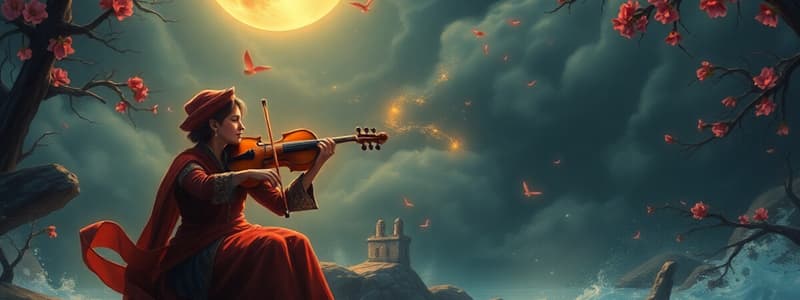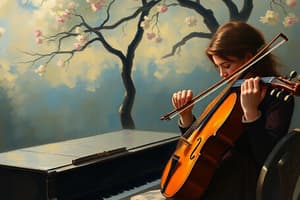Podcast
Questions and Answers
What characterizes a concerto?
What characterizes a concerto?
- A piece composed specifically for solo piano
- A composition for orchestra and solo instruments, typically in three movements (correct)
- A single performer with choir accompaniment
- A dance form that is performed in triple time
Which term describes a piece that develops a specific point of technique?
Which term describes a piece that develops a specific point of technique?
- Etude (correct)
- Overture
- Largo
- Prelude
What best describes a nocturne?
What best describes a nocturne?
- A lively dance in triple time
- A structured piece for string quartet
- An orchestral composition featuring a soloist
- An instrumental composition with a pensive, dreamy mood (correct)
What is the primary purpose of program music?
What is the primary purpose of program music?
What type of dance is a mazurka?
What type of dance is a mazurka?
What characterizes the music of the Romantic Period?
What characterizes the music of the Romantic Period?
Which composition is an example of nationalism in Romantic music?
Which composition is an example of nationalism in Romantic music?
What compositional style is commonly associated with the piano music of the Romantic Period?
What compositional style is commonly associated with the piano music of the Romantic Period?
How did Ludwig Van Beethoven contribute to the transition from the Classical to the Romantic era?
How did Ludwig Van Beethoven contribute to the transition from the Classical to the Romantic era?
What was one reason Niccolo Paganini was considered a unique violin virtuoso?
What was one reason Niccolo Paganini was considered a unique violin virtuoso?
What misconception surrounded Niccolo Paganini's violin skills?
What misconception surrounded Niccolo Paganini's violin skills?
Which composer was NOT directly inspired by Niccolo Paganini?
Which composer was NOT directly inspired by Niccolo Paganini?
What type of music was effectively expanded during the Romantic Period?
What type of music was effectively expanded during the Romantic Period?
What musical form is characterized by a playful character and typically follows an ABA structure?
What musical form is characterized by a playful character and typically follows an ABA structure?
Which of the following best describes the primary characteristic of Franz Liszt's works?
Which of the following best describes the primary characteristic of Franz Liszt's works?
Which composition by Liszt is famous for being popularized through the cartoon 'Tom & Jerry'?
Which composition by Liszt is famous for being popularized through the cartoon 'Tom & Jerry'?
What is a defining feature of the Polonaise dance?
What is a defining feature of the Polonaise dance?
Which term describes an instrumental composition that conveys a pensive or dreamy mood, typically for piano?
Which term describes an instrumental composition that conveys a pensive or dreamy mood, typically for piano?
Which of these works is NOT associated with Franz Liszt?
Which of these works is NOT associated with Franz Liszt?
In which area was Liszt considered a pioneer during the Romantic Era?
In which area was Liszt considered a pioneer during the Romantic Era?
What is the primary function of a Prelude in music?
What is the primary function of a Prelude in music?
What is Frederic Chopin most commonly referred to as?
What is Frederic Chopin most commonly referred to as?
At what age did Frederic Chopin start playing the piano?
At what age did Frederic Chopin start playing the piano?
Which of the following compositions is NOT mentioned as one of Chopin's well-known works?
Which of the following compositions is NOT mentioned as one of Chopin's well-known works?
What condition was Chopin diagnosed with later in his life?
What condition was Chopin diagnosed with later in his life?
Which famous writer did Chopin meet and marry during his time in Paris?
Which famous writer did Chopin meet and marry during his time in Paris?
What motivates the young musician in the 'Story of Symphonie Fantastique' to take opium?
What motivates the young musician in the 'Story of Symphonie Fantastique' to take opium?
What aspect of composition does the young musician emphasize in his works?
What aspect of composition does the young musician emphasize in his works?
Which movement of 'Symphonie Fantastique' is characterized by a slow introduction followed by agitated sections?
Which movement of 'Symphonie Fantastique' is characterized by a slow introduction followed by agitated sections?
What was Peter Ilyich Tchaikovsky's primary area of specialization during his career?
What was Peter Ilyich Tchaikovsky's primary area of specialization during his career?
What was the initial career path that Schumann's father wanted for him?
What was the initial career path that Schumann's father wanted for him?
What was one significant challenge Tchaikovsky faced during his life?
What was one significant challenge Tchaikovsky faced during his life?
In which location did Tchaikovsky continue his music career despite personal challenges?
In which location did Tchaikovsky continue his music career despite personal challenges?
What significant event affected Schumann's career as a pianist?
What significant event affected Schumann's career as a pianist?
Which publication did Schumann found and edit?
Which publication did Schumann found and edit?
Which of the following works contributed to Tchaikovsky's fame?
Which of the following works contributed to Tchaikovsky's fame?
Which of the following compositions is by Schumann?
Which of the following compositions is by Schumann?
How did Tchaikovsky's compositions often incorporate cultural elements?
How did Tchaikovsky's compositions often incorporate cultural elements?
What are the names of the two pseudonyms Schumann used in his writings?
What are the names of the two pseudonyms Schumann used in his writings?
Which characterizes program music?
Which characterizes program music?
What did Hector Berlioz initially pursue before entering music?
What did Hector Berlioz initially pursue before entering music?
What is one of Berlioz's most famous compositions?
What is one of Berlioz's most famous compositions?
Flashcards
Frederic Chopin
Frederic Chopin
A Polish composer known for his piano music, often referred to as the "Poet of the Piano". His compositions are known for their beauty, grace, and elegance.
Etude
Etude
A piece of music designed to help a musician improve a specific technical skill on a musical instrument. Chopin is famous for his etudes, such as the Revolutionary Etude.
Ballade
Ballade
A type of musical composition that tells a story. Chopin's ballades are known for their emotion and drama.
Mazurka
Mazurka
Signup and view all the flashcards
Polonaise
Polonaise
Signup and view all the flashcards
Waltz
Waltz
Signup and view all the flashcards
Impromptu
Impromptu
Signup and view all the flashcards
Nocturne
Nocturne
Signup and view all the flashcards
Scherzo
Scherzo
Signup and view all the flashcards
Sonata
Sonata
Signup and view all the flashcards
Romantic Period
Romantic Period
Signup and view all the flashcards
Program Music
Program Music
Signup and view all the flashcards
Virtuoso Piece
Virtuoso Piece
Signup and view all the flashcards
Niccolo Paganini
Niccolo Paganini
Signup and view all the flashcards
"La Campanella" by Niccolo Paganini
"La Campanella" by Niccolo Paganini
Signup and view all the flashcards
24 Caprices for Solo Violin, Op. 1
24 Caprices for Solo Violin, Op. 1
Signup and view all the flashcards
Neue Zeitschrift fur Musik
Neue Zeitschrift fur Musik
Signup and view all the flashcards
Kinderszenen
Kinderszenen
Signup and view all the flashcards
Carnaval
Carnaval
Signup and view all the flashcards
Hector Berlioz
Hector Berlioz
Signup and view all the flashcards
Symphonie Fantastique
Symphonie Fantastique
Signup and view all the flashcards
Fantastic Symphony
Fantastic Symphony
Signup and view all the flashcards
Tone Color
Tone Color
Signup and view all the flashcards
Beloved's Theme
Beloved's Theme
Signup and view all the flashcards
Program Symphony
Program Symphony
Signup and view all the flashcards
Reveries - Passion
Reveries - Passion
Signup and view all the flashcards
Idée Fixe
Idée Fixe
Signup and view all the flashcards
Tchaikovsky's Early Career
Tchaikovsky's Early Career
Signup and view all the flashcards
Folk Music Influence
Folk Music Influence
Signup and view all the flashcards
Haunting Melodies
Haunting Melodies
Signup and view all the flashcards
Concerto
Concerto
Signup and view all the flashcards
Largo
Largo
Signup and view all the flashcards
Study Notes
Romantic Period Music (1820-1910)
- Characterized by emotion, imagination, individualism, and freedom of expression
- Nationalism incorporated into music, exemplified by Chopin's Polonaise
- Beethoven bridged the Classical and Romantic eras, inspiring emotional expression and expanded orchestras
- Romantic piano music is in free forms like fantasies, rhapsodies, ballades, and nocturnes
- Program music, like Symphony Fantastique, portrays literature, history, emotions, and nature
Violin and Strings Music - Niccolo Paganini
- Born October 27, 1782, in Genoa, Italy
- Began playing mandolin at age 5, then violin at 7
- Developed exceptional violin skills, influencing many other composers
- Rumored to have sold his soul for skills; known for problems with women and gambling
- His compositions inspired other composers, such as Franz Liszt,Frederic Chopin, and Robert Schumann
Piano Music
- Romantic piano music required high virtuosity
- Some were recreations of Classical sonatas
- Adaptations of Romantic period piano compositions exist as songs today
Frederic Chopin
- Born March 1, 1810, in Zelazowa, Poland
- Began playing piano at age 4, composed polonaises at 7
- Studied at Warsaw Conservatory; influenced by folk music
- Primarily composed for piano; used the piano pedal extensively
- Famous works include Fantasie in F minor, Op. 49, Revolutionary Etude, Op. 10, No. 12, and 24 Preludes, Op. 28.
Franz Liszt
- Known for virtuosity; a busy, prolific composer and performer during the Romantic era
- Born in Hungary, displayed early talent; passionate about piano performance
- Focused on virtuoso piano playing; notably known for his symphonic poems and piano transcriptions of operas and symphonies
- Generous with time and money towards orphans and the less fortunate
Robert Schumann
- A noted Romantic composer and music critic
- Born in 1810; studied law, but transitioned to music
- Founded the journal "Neue Zeitschrift für Musik"
- Also composed works under pseudonyms, Eusebius (lyrical side) and Florestan (fiery side)
- Known piano works include Abegg Variations, Davidsbündlertänze, Carnaval, and Fantasiestücke, among others
- Contained orchestral music and art songs, such as Frauenliebe und Leben
Program Music - Hector Berlioz
- A French Romantic composer (born December 11, 1803)
- Famous for the five-movement "Symphonie Fantastique" (or "Fantastic Symphony")
- A program piece depicting a musician's experiences and hallucinations after taking opium
- Focused on tone color in his compositions
Peter Ilyich Tchaikovsky
- A Russian composer known for his ballet music, born May 7, 1840.
- Initially studied law; later transitioned to music composition.
- Known for works like Swan Lake, The Nutcracker, 1812 Overture, The Sleeping Beauty, and Symphony No. 6
Camille Saint-Saëns
- A French composer and pianist known for elegance and creativity in his compositions
- Born October 9, 1835, in Paris; taught himself from an early age
- Famous for the "Carnival of the Animals," "Danse Macabre" , Symphony No. 3, and The Swan, amongst many other works
Glossary Terms
- Adagio: Slow tempo
- Allegro: Quick tempo
- Allegretto: Moderately quick tempo
- Ballade: A musical verse-form piece
- Ballet: Group or solo dance with musical accompaniment
- Concerto: Music for orchestra and solo instruments
- Etude: Composition for developing a specific technique
- Largo: Very slow tempo
- Mazurka: A Polish dance
- Nocturne: An instrumental piece with a pensive mood.
- Nationalism: Devotion to one's nation.
- Overture: Instrumental introduction to an extended work
- Piano music: Music created for the piano
- Polonaise: A Polish promenade dance
- Program music: Music portraying a non-musical scene, incident, idea.
- Rubato: Flexible rhythm in a phrase.
- Scherzo: Playful movement in music
- Sonata: Composition for one or more solo instruments.
- Symphony: Extended composition for orchestra, typically in multiple movements
- Virtuoso: A highly skilled musician
- Waltz: A dance in triple time involving couples circling.
- Symphony poem: Single-movement orchestral work with a program
Studying That Suits You
Use AI to generate personalized quizzes and flashcards to suit your learning preferences.




